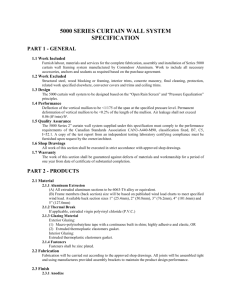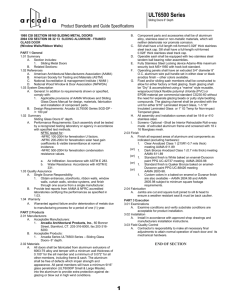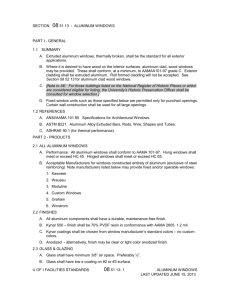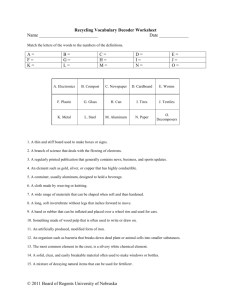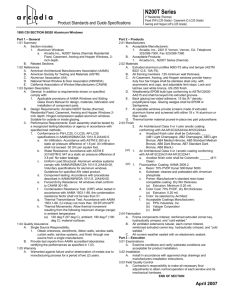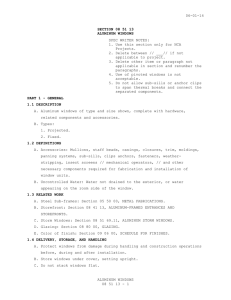02-01-16 SECTION 08 51 13 ALUMINUM WINDOWS
advertisement
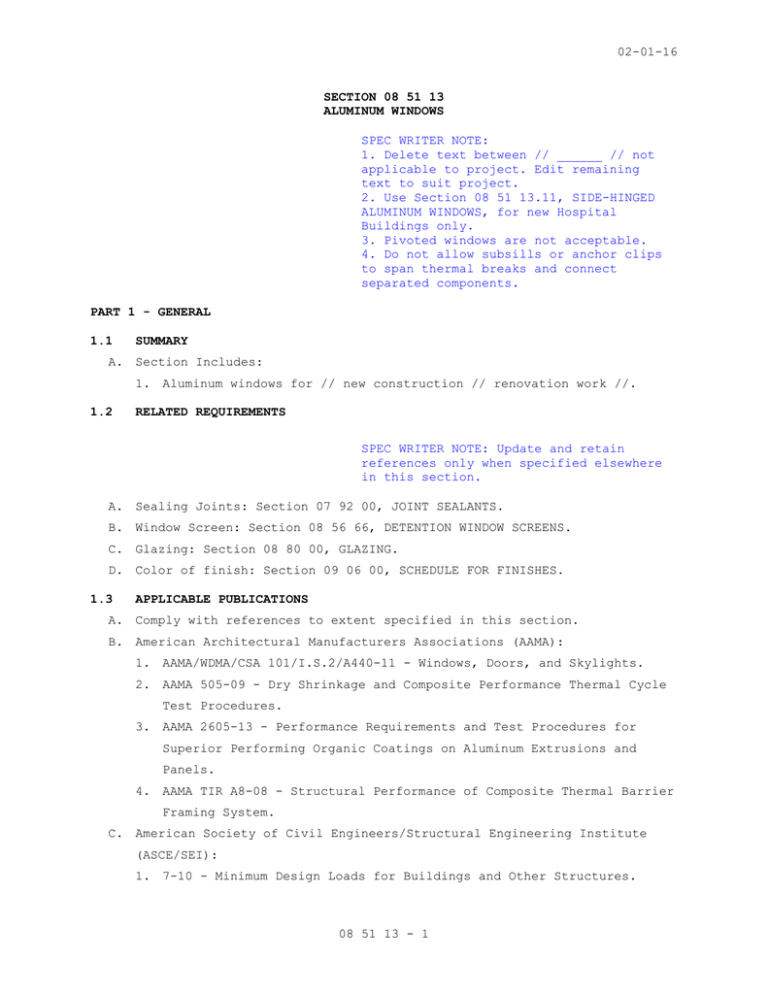
02-01-16 SECTION 08 51 13 ALUMINUM WINDOWS SPEC WRITER NOTE: 1. Delete text between // ______ // not applicable to project. Edit remaining text to suit project. 2. Use Section 08 51 13.11, SIDE-HINGED ALUMINUM WINDOWS, for new Hospital Buildings only. 3. Pivoted windows are not acceptable. 4. Do not allow subsills or anchor clips to span thermal breaks and connect separated components. PART 1 - GENERAL 1.1 SUMMARY A. Section Includes: 1. Aluminum windows for // new construction // renovation work //. 1.2 RELATED REQUIREMENTS SPEC WRITER NOTE: Update and retain references only when specified elsewhere in this section. A. Sealing Joints: Section 07 92 00, JOINT SEALANTS. B. Window Screen: Section 08 56 66, DETENTION WINDOW SCREENS. C. Glazing: Section 08 80 00, GLAZING. D. Color of finish: Section 09 06 00, SCHEDULE FOR FINISHES. 1.3 APPLICABLE PUBLICATIONS A. Comply with references to extent specified in this section. B. American Architectural Manufacturers Associations (AAMA): 1. AAMA/WDMA/CSA 101/I.S.2/A440-11 - Windows, Doors, and Skylights. 2. AAMA 505-09 - Dry Shrinkage and Composite Performance Thermal Cycle Test Procedures. 3. AAMA 2605-13 - Performance Requirements and Test Procedures for Superior Performing Organic Coatings on Aluminum Extrusions and Panels. 4. AAMA TIR A8-08 - Structural Performance of Composite Thermal Barrier Framing System. C. American Society of Civil Engineers/Structural Engineering Institute (ASCE/SEI): 1. 7-10 - Minimum Design Loads for Buildings and Other Structures. 08 51 13 - 1 02-01-16 D. American Society of Heating, Refrigerating and Air-Conditioning Engineers (ASHRAE): 1. 90.1-13 - Energy Standard for Buildings Except Low-Rise Residential Buildings. E. ASTM International (ASTM): 1. B209-14 - Aluminum and Aluminum-Alloy Sheet and Plate. 2. B209M-14 - Aluminum and Aluminum-Alloy Sheet and Plate (Metric). 3. B221-14 - Aluminum and Aluminum-Alloy Extruded Bars, Rods, Wire, Profiles, and Tubes. 4. B221M-13 - Aluminum and Aluminum-Alloy Extruded Bars, Rods, Wire, Profiles, and Tubes (Metric). 5. E283-04(2012) - Determining Rate of Air Leakage Through Exterior Windows, Curtain Walls, and Doors Under Specified Pressure Differences Across the Specimen. 6. E331-00(2009) - Water Penetration of Exterior Windows, Skylights, Doors, and Curtain Walls by Uniform Static Air Pressure Difference. 1.4 PREINSTALLATION MEETINGS A. Conduct preinstallation meeting // at project site // minimum 30 days before beginning Work of this section. SPEC WRITER NOTE: Edit participant list to ensure entities influencing outcome attend. 1. Required Participants: a. Contracting Officer's Representative. b. // Architect/Engineer. // c. // Inspection and Testing Agency. // d. Contractor. e. Installer. f. // Manufacturer's field representative. // SPEC WRITER NOTE: Edit meeting agenda to incorporate project specific topics. 2. Meeting Agenda: Distribute agenda to participants minimum 3 days before meeting. a. Installation schedule. b. Installation sequence. c. Preparatory work. 08 51 13 - 2 02-01-16 d. Protection before, during, and after installation. e. Installation. f. Transitions and connections to other work. g. Other items affecting successful completion. 3. Document and distribute meeting minutes to participants to record decisions affecting installation. 1.5 SUBMITTAL A. Submit according to Section 01 33 23, SHOP DRAWINGS, PRODUCT DATA, AND SAMPLES. B. Submittal Drawings: 1. Indicate window types required for project. 2. Identify window unit components by name and type of metal or material, show construction, locking systems, mechanical operators, trim, installation and anchorages. 3. Include glazing details and standards for factory glazed units. C. Manufacturer's Literature and Data: 1. Description of each product. 2. Installation instructions. 3. Warranty. SPEC WRITER NOTE: Samples are not required for clear anodizing. D. Sustainable Construction Submittals: SPEC WRITER NOTE: Retain sustainable construction submittals appropriate to product. 1. Recycled Content: Identify post-consumer and pre-consumer recycled content percentage by weight. E. Samples: 1. Window Frame: 150 mm (6 inch) long samples showing finishes, specified. F. Test reports: Indicate each product complies with specifications. 1. Windows. 2. Operating hardware. G. Certificates: Indicate each product complies with requirements (window characteristics may be on window schedule or other drawings). 08 51 13 - 3 02-01-16 1.6 QUALITY ASSURANCE A. Manufacturer Qualifications: 1. Regularly manufactures specified products. 2. Manufactured specified products with satisfactory service on five similar installations for minimum five years. a. Provide contact names and addresses for completed projects when requested by Contracting Officer's Representative. B. Quality Certified Labels or Certificates: 1. AAMA Label affixed to each window indicating compliance with specification. 2. Certificates in lieu of label with copy of test report maximum 4 years old from independent testing laboratory and certificate signed by window manufacturer stating that windows provided comply with specified requirements and AAMA/WDMA/CSA 101/I.S.2/A440 for type of window specified. 1.7 STORAGE AND HANDLING A. Protect windows from damage during handling and construction operations before, during and after installation. B. Store windows under cover, setting upright. C. Do not stack windows flat. D. Do not lay building materials or equipment on windows. 1.8 WARRANTY SPEC WRITER NOTE: Always retain construction warranty. FAR includes Contractor's one year labor and material warranty. A. Construction Warranty: FAR clause 52.246-21, "Warranty of Construction." SPEC WRITER NOTE: Specify extended manufacturer's warranties for materials only. B. Manufacturer's Warranty: Warrant windows against material and manufacturing defects. 08 51 13 - 4 02-01-16 SPEC WRITER NOTE: Specify customarily available warranty period for specified products. 1. Warranty Period: 10 years. PART 2 - PRODUCTS 2.1 SYSTEM PERFORMANCE A. Design windows complying with specified performance: 1. Load Resistance: // ASCE/SEI 7 // Design criteria as indicated on Drawings //. a. Performance Grade: AAMA/WDMA/CSA 101/I.S.2/A440 required to resist maximum positive and negative wind load. SPEC WRITER NOTES: 1. Omit CRF for climates where condensation is not a normal consideration. 2. States where the winter outdoor design temperature is below 4 C degree (40 degree F.) raise the factor as appropriate. See AAMA/WDMA/CSA 101/I.S.2/A440. 2. Thermal Transmittance: Maximum U-value W/sq. m/degree K (Btu/sq. ft./hr./degree F). a. Insulating Glass Windows: U-2.8 (U-0.5). b. Dual Glazed Windows: U-4.0 (U-0.7), or as required by ASHRAE 90.1. 3. Condensation Resistance Factor (CRF): NFRC 500 Minimum CRF of // C 45 // C 50 // C 55 //. SPEC WRITER NOTE: First option for the following two paragraphs pertain to AAMA’S CW Performance Classifications; Second option is used for AW Classifications. 4. Water Resistance: ASTM E331; No uncontrolled penetration at // 220 Pa (4.50 psf) // 390 Pa (8.00 psf) //, minimum, pressure differential. 5. Air Infiltration Resistance: ASTM E283; // 1.5 // 0.5 // L/s/sq. m (// 0.3 // 0.1 // cfm/sq. ft.), maximum at // 75 Pa (1.57 psf) // 300 Pa (6.24 psf) //, minimum, pressure differential. 08 51 13 - 5 02-01-16 B. Provide the following operation types for locations indicated on the Drawings. 1. Hung Windows: // Single // Double // Triple // hung. a. Performance Class and Grade: AAMA/WDMA/CSA 101/I.S.2/A440, minimum // CW-30 // AW-40 //. b. Provide units with tilt-in feature permitting both sides of both sash to be cleaned from interior. 1) Restrict sash tilting without use of maintenance release mechanism and removable locking handle. 2) Finger operated tilt latches not acceptable. 2. Casement Windows: a. Performance Class and Grade: AAMA/WDMA/CSA 101/I.S.2/A440, minimum // CW-30 // AW-40 //. 3. Projected Windows: a. Performance Class and Grade: AAMA/WDMA/CSA 101/I.S.2/A440, minimum // CW-30 // AW-40 //. b. Operation: 1) Awning Sash: Project-out and slide down from top. 2) Hopper Sash: Project-in from top and slide up from bottom. 4. Dual Horizontal Sliding Windows: a. Performance Class and Grade: AAMA/WDMA/CSA 101/I.S.2/A440, minimum // CW-30 // AW-40 //. 5. Single Sash Horizontal Sliding Windows: a. Performance Class and Grade: AAMA/WDMA/CSA 101/I.S.2/A440, minimum // CW-30 // AW-40 //. SPEC WRITER NOTE: 1. Fixed windows are not desired due to exterior cleaning. 2. Use fixed windows at ground level only where accessible, for spandrel glass, or on interior. 3. Coordinate with Section 08 41 13, ALUMINUM-FRAMED ENTRANCES AND STOREFRONTS to clearly identify windows applicable to each section. 4. Do not use for fixed sash with other window types when uniform appearance is desired. 6. Fixed Windows: a. Performance Class and Grade: AAMA/WDMA/CSA 101/I.S.2/A440, minimum // CW-30 // AW-40 //. 08 51 13 - 6 02-01-16 2.2 MATERIALS A. Aluminum Extrusions: ASTM B221M (ASTM B221); 6063 alloy, T5 temper. B. Aluminum Sheet: ASTM B209M (ASTM B209); 5005 alloy, H15 or H34 temper. 2.3 PRODUCTS - GENERAL A. Basis of Design: Section 09 06 00, SCHEDULE FOR FINISHES. B. Provide windows from one manufacturer. C. Sustainable Construction Requirements: SPEC WRITER NOTE: Aluminum Association (AA) reports 2008 industry average 85 percent recycled content for aluminum in building construction industry. 1. Aluminum Recycled Content: 80 total recycled content, minimum. 2.4 ALUMINUM WINDOWS A. Frames and Sashes: Aluminum extrusions, AAMA/WDMA/CSA 101/I.S.2/A440. B. Thermal-Break Window Construction: 1. Manufacturer’s Standard. 2. Low conductance thermal barrier. 3. Capable of structurally holding sash in position and together. 4. Thermal Break Assemblies: Tested according to AAMA TIR A8 and AAMA 505. 5. Design location of thermal break so that, in closed position, outside air does not come in direct contact with interior frame of window. C. Mullions: Match window units. D. Provide anchors and other related accessories required for installation. 2.5 GLAZING A. Glass and Glazing: As specified in Section 08 80 00, GLAZING. 1. Factory glaze windows. 2. Weep holes through glazed areas are not acceptable. 2.6 INSECT SCREENING SPEC WRITER NOTE: Use vinyl clad aluminum insect screen cloth in geographical areas subject to salt, fog or industrial fumes. A. Screen Mesh: 18 by 18, AAMA/WDMA/CSA 101/I.S.2/A440. 1. Screen Cloth: // Aluminum // Vinyl clad aluminum //. 08 51 13 - 7 02-01-16 B. Frame: Aluminum, match window unit finish type and color, unless otherwise indicated. 2.7 HARDWARE A. Locks: Two position locking bolts or cam type tamperproof custodial locks with a single point control located not higher than 1500 mm (60 inches) from floor level. Locate locking devices in vent side rail. Provide concealed or nonremovable fastenings for locks and keepers. B. Locking Device Strikes: Locate adjustable strikes in frame jamb. Fabricate strikes from Type 304 stainless steel or white bronze. C. Fabricate hinges of noncorrosive metal. Hinges may be either fully concealed when window is closed or semi-concealed with exposed knuckles and hospital tips. Surface mounted hinges are not acceptable. D. Guide Blocks: Fabricate guide blocks of injection molded nylon. Install guide block fully concealed in vent/frame sill. E. Hardware for Emergency Ventilation of Windows: 1. Provide windows with hold open linkage. 2. Provide hold open hardware for maximum 150 mm (6 inches) of window opening with adjustable friction shoe to provide resistance when closing window. 3. Handles: Removable type. F. Hardware for Maintenance Opening of Windows: Opening beyond limit stop position accomplished by maintenance key captured by release device when window is in open position. 1. Design operating device to prevent opening with standard tools, coins or bent wire devices. SPEC WRITER NOTE: Use following only for non-patient rooms. G. Pole Operators: 1. Provide pole operator and pole hanger where operable windows have hardware more than 1500 mm (60 inches) above floor, but not over 3000 mm (10 feet) above floor. 2. Fabricate pole of tubular anodized aluminum with rubber cap at lower end and standard push-pull hook at top end to match hardware design. 3. Provide sufficient length for window operation without reaching more than 1500 mm (60 inches) above floor. 4. Provide one operating pole and one pole hanger in each room or space where pole operation of windows is required. 08 51 13 - 8 02-01-16 H. Weather Stripping: AAMA/WDMA/CSA 101/I.S.2/A440; leaf type weather-stripping is not acceptable. I. Provide wrenches, keys, or removable locking operating handles, as specified to operate windows. 1. Provide one emergency ventilating operating handle for every four windows. 2. Provide maintenance or window washer operating handles as required. 2.8 FABRICATION A. Fabricate windows to comply specified performance class and grade. 1. Assemble frame and sash so fasteners are concealed when window is closed. 2. Attach locking and hold-open devices to windows with concealed fasteners. 3. Where extrusion wall thickness is less than 3 mm (0.125 inch) thick, provide backup plates or similar reinforcements for fasteners. 4. Use stainless steel fasteners to secure Venetian blind hanger clips, vent guide blocks, friction adjuster, and limit opening device. B. Aluminum Trim: 1. Trim includes casings, closures, and panning. 2. Fabricate to shapes shown, minimum 1.6 mm (0.062 inch) thick. 3. Extruded or formed sections, straight, true, and smooth on exposed surfaces. // Curved sections true to line //. 4. Exposed external corners mitered and internal corners coped; fitted with hairline joints. 5. Reinforce 1.6 mm (0.062 inch) thick members with minimum 3 mm (1/8 inch) thick aluminum. 6. Except for strap anchors, provide reinforcing for fastening near ends and spaced maximum 300 mm (12 inches) on center. 7. Design to allow unrestricted expansion and contraction of members and window frames. 8. Secure to window frames with machine screws or expansion rivets. 9. Exposed screws, fasteners or pop rivets are not acceptable on exterior of casing or trim cover system. C. Aluminum Subsills and Stools: 1. Fabricate to shapes shown, minimum 2 mm (0.080 inch) thick extrusion. 2. One piece full length of opening with concealed anchors. 08 51 13 - 9 02-01-16 3. Sills turned up back edge minimum 6 mm (1/4 inch). Front edge provide with drip. 4. Sill back edge behind face of window frame. Do not extend to interior surface or bridge thermal breaks. 5. Do not perforate for anchorage, clip screws, or other requirements. SPEC WRITER NOTE: 1. Coordinate with Section 09 06 00, SCHEDULE FOR FINISHES. 2 Clearly designate which windows receive different finishes and colors when more than one occur. 2.9 FINISHES A. Finish window units according to NAAMM AMP 500 series. B. Anodized Aluminum: 1. Clear Anodized Finish: AA-C22A41; Class I Architectural, 0.018 mm (0.7 mil) thick. 2. Color Anodized Finish: AA-C22A42 or AA-C22A44; Class I Architectural, 0.018 mm (0.7 mil) thick. C. Aluminum Paint finish: SPEC WRITER NOTE: Other high end finish are also available: 3-coat metallic, and 2-coat mica finishes. 1. Fluorocarbon Finish: AAMA 2605; 70 percent fluoropolymer resin, 2-coat system. 2. Color: Refer to Section 09 06 00, SCHEDULE FOR FINISHES. D. Hardware: Finish hardware exposed when window is in closed position to match window. 2.10 ACCESSORIES A. Fasteners: AAMA/WDMA/CSA 101/I.S.2/A440; non-magnetic stainless steel. PART 3 - EXECUTION 3.1 PREPARATION A. Examine and verify substrate suitability for product installation. 1. Verify openings are within acceptable tolerances. B. Protect existing construction and completed work from damage. 08 51 13 - 10 02-01-16 SPEC WRITER NOTE: 1. Include the following paragraph below for replacing existing windows. 2. Coordinate with demolition for replacement window projects for removal. C. Remove existing windows to permit new installation when replacement window is available, and ready for immediate installation. 1. Remove existing work carefully; avoid damage to existing work indicated to remain. 2. Perform other operations as necessary to prepare openings for proper installation and operation of new windows. 3. Do not leave openings uncovered at end of working day, during precipitation or temperatures below 16 degrees C (60 degrees F). 3.2 INSTALLATION, GENERAL A. Install products according to manufacturer's instructions // and approved submittal drawings //. 1. When manufacturer's instructions deviate from specifications, submit proposed resolution for Contracting Officer's Representative consideration. B. Where type, size or spacing of fastenings for securing window accessories or equipment to building construction is not shown or specified, provide expansion or toggle bolts or screws, as best suited to construction material. 1. Provide bolts or screws minimum 6 mm (1/4 inch) in diameter. 2. Sized and spaced to resist tensile and shear loads imposed. 3. Do not install exposed fasteners on exterior, except when unavoidable for application of hardware. 4. Provide non-magnetic stainless steel Phillips flat-head machine screws for exposed fasteners, where required, or special tamper-proof fasteners. 5. Locate fasteners to avoid disturbing window thermal break. C. Set windows plumb, level, true, and in alignment; without warp or rack of frames or sash. D. Anchor windows on four sides with anchor clips or fin trim. 1. Do not allow anchor clips to bridge thermal breaks. 2. Use separate clips for both sides of thermal breaks. 3. Make connections to allow for thermal and other movements. 4. Do not allow building load to bear on windows. 08 51 13 - 11 02-01-16 5. Use manufacturer's standard clips at corners and maximum 600 mm (24 inches) on center. 6. Where fin trim anchorage is indicated build into adjacent construction, anchoring at corners and maximum 600 mm (24 inches) on center. E. Sills and Stools: 1. Set in bed of mortar or other compound to fully support, true to line shown. 2. Do not extend sill to inside window surface or past thermal break. 3. Leave space for sealants at ends and to window frame unless indicated otherwise. 3.3 MULLIONS CLOSURES, TRIM, AND PANNING A. Cut mullion full height of opening and anchor directly to window frame on both sides. B. Closures, Trim, and Panning: External corners mitered and internal corners coped, fitted with hairline, tightly closed joints. 1. Secure to concrete and solid masonry with expansion bolts, expansion rivets, split shank drive bolts, or powder actuated drive pins. 2. Toggle bolt to hollow masonry units. 3. Screw to wood and metal. C. Fasten except for strap anchors, near ends and corners and maximum 300 mm (12 inches) on center. D. Seal units following installation to provide weathertight system. 3.4 ADJUSTING A. Adjust ventilating sash and hardware to provide tight fit at contact points, and at weather-stripping for smooth operation and weathertight closure. 3.5 FIELD TESTING SPEC WRITER NOTE: Section 01 45 29, TESTING LABORATORY SERVICES includes VA provided testing for large projects and contractor provided testing for small projects. Coordinate testing responsibility. A. Field Tests: Performed by testing laboratory specified in Section 01 45 29, TESTING LABORATORY SERVICES. B. Test Method: AAMA 502. 08 51 13 - 12 02-01-16 C. Test Specimen: 1. Include window assembly and construction. Affix test chamber to interior side of test specimen and the conduct testing using positive static air pressure (Test method A). 2. Test specimens to be selected by the Contracting Officer's Representative after windows have been installed according to the drawings and specification. 3.6 CLEANING A. Lubricate hardware and moving parts. B. Remove excess glazing and sealant compounds. C. Clean exposed aluminum and glass surfaces. Remove contaminants and stains. D. Keep windows locked except while adjusting and testing. - - E N D - - 08 51 13 - 13
